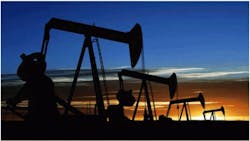Donald Trump’s allies in the oil industry are warning the president that his bid to boost U.S. steelmakers could backfire against their efforts to achieve his goal of "American energy dominance."
The intense lobbying effort comes as the Commerce Department faces a July 23 deadline to give the president a plan to require oil and gas pipelines use American-made steel, an idea Trump embraced in the initial days of his presidency. While the U.S. has imposed "Buy American" rules on government purchases for decades, it would be unprecedented to force those obligations on privately funded, commercial projects.
The blueprint from Commerce Secretary Wilbur Ross will set the stage for further protests from the oil industry, the U.S. Chamber of Commerce and developers, including The Williams Companies Inc. and Energy Transfer Partners.
"A core feature of the U.S. free enterprise system" is that "private businesses should be free to make purchasing decisions on their own," the Chamber of Commerce, the biggest-spending business lobby in Washington, said in its comments to Ross.
The effort illustrates how Trump’s "America-first" agenda pits his allies against one another and underscores the challenges of fulfilling the president’s protectionist stance. As with Trump’s promises to restrict immigration from Muslim-majority nations, rework former President Barack Obama’s health care law and overhaul the tax code, the reality of implementing this idea has been more difficult than the president initially posited.
Trump kicked off the pipeline-focused effort during his fourth day in office, by issuing a presidential memorandum compelling the Commerce Department to determine how to require American material in all, retrofitted, repaired or expanded U.S. pipelines "to the extent permitted by law." Under Trump’s directive, iron and steel only qualifies as American-made if it is fully produced in the United States, from its initial melting to the later application of coatings. The memo was hastily produced, not subject to lengthy administration debate or scrutiny.
Separately, the Trump administration is investigating whether foreign steel threatens U.S. national security -- a probe that could lead to tariffs or quotas on those imports.
While pipeline developers have praised Trump’s approval of projects that stalled under Obama, including TransCanada Corp.’s Keystone XL and Energy Transfer’s Dakota Access, they warn America-made requirements could undercut that progress. More than three quarters of pipe used in oil and gas projects begins as imported steel, according to one industry study.
"Fewer new pipeline projects would run counter to the Trump administration’s goal of expanding U.S. energy production and infrastructure to support the economy, job growth and national security," said a coalition of oil industry trade groups, including the American Petroleum Institute and the American Gas Association. Relying solely on U.S.-produced pipeline-quality steel and components "could lead to long construction delays and higher costs, potentially canceling planned pipeline projects or blocking new pipeline projects."
Energy Transfer said that when it purchased pipe for three U.S. projects simultaneously, it effectively consumed the entire domestic capacity.
It’s not clear how the U.S. government could enforce the mandate, though multiple federal agencies can play a role permitting pipeline projects and scrutinizing their operations.
Steel Dynamics Inc., one of the largest domestic steel producers, recommended the Trump administration impose an American-made requirement through the Federal Energy Regulatory Commission, which reviews proposals to build interstate pipelines to ensure they comply with safety, security and environmental standards.
"Pipeline applications not using domestic pipe from domestic steel should be rejected unless an applicant proves that there is no available domestic pipe made from domestic steel that meets the pipeline’s specifications," Steel Dynamics told the Commerce Department in written comments.
Many steel producers, including ArcelorMittal USA LLC, Nucor Corp., and U.S. Steel Corp., say Trump’s plans could help revive the industry, which is struggling to compete amid a worldwide glut of the product.
"At a time when the domestic steel industry faces unprecedented challenges resulting from massive global overcapacity and surges of unfairly traded imports, domestic preference provisions are even more critical to stimulating domestic production and employment throughout the steelmaking supply chain," Nucor said in comments to Commerce.
But pipeline builders argue many steel mills have elected not to invest in producing a specialized pipe that meets industry standards for integrity and strength that make it usable in oil and gas pipelines. Fewer still produce large pipe with very thick walls -- the kind typically used for long-distance projects. About 77% of steel used in U.S. pipelines today begins abroad -- with roughly half of the pipe foreign sourced and the remaining half made in the U.S., using imported steel, according to a study from ICF International Inc. cited by the American Petroleum Institute.
The Alliance for American Manufacturing told the Trump administration it shouldn’t be swayed by arguments there isn’t enough capacity to churn out the steel pipe the oil and gas industry requires. Supporters point to Philadelphia-based Sunoco Logistics’ plans to fully source its 350-mile Mariner East 2 pipeline with 75,000 tons of domestically produced steel. That project is evidence that U.S. companies can meet the oil industry’s needs, the manufacturing alliance said.
Buy America
"Buy America" preferences are now set for government-funded projects, such as highways and passenger-rail systems. But trade lawyers say putting similar requirements on commercial endeavors would be difficult -- and might be illegal.
"Current law does not authorize the U.S. government to impose domestic-origin requirements on privately owned, operated and funded pipelines," said Scott Lincicome, a trade attorney with White & Case LLP. It also is inconsistent with the rules of the World Trade Organization -- the same forum the U.S. has used to object to other countries’ local-content requirements.
"The United States is one of the top complainants when it comes to local-content requirements around the world, so it would be quite a reversal of policy for the United States itself to institute such measures for pipelines," Lincicome said.
By Jennifer A. Dlouhy
About the Author
Bloomberg
Licensed content from Bloomberg, copyright 2016.
